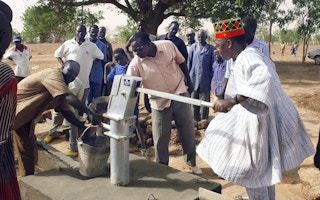Climate change, extreme weather, health, rapid urbanization, water and sanitation, food security, energy and infrastructure are challenging communities around the world. All of these are expected to be part of the Sustainable Development Goals (SDGs), a global framework to be announced this September aiming to set the world towards a sustainable future.
As we mark United Nations World Water Day on 22 March, it’s more important than ever to understand the vital role of water in unlocking this future. Tackling water and sanitation challenges will create a ripple effect across the expected set of SDGs as water is crucial to many of the challenges the SDGs aim to address:
- Health and disease: Globally, 2.5 billion people lack adequate sanitation facilities and 1 billion practice open defecation, costing the world $260 billion annually. Closing this gap will help prevent water-related diseases such as diarrhoea, the second leading cause of death in children under the age of five. Of the 760 000 children who die of diarrhoea every year, 88 per cent of deaths are attributed to unsafe water, inadequate sanitation and insufficient hygiene.
- Malnutrition and child development: In India, 90 million people do not have access to safe drinking water and almost 800 million lack adequate sanitation. Poor sanitation, rather than insufficient food, is emerging as a key factor in malnourishment, which leads to stunting of growth in an estimated 65 million children in India under the age of five as nutrients and energy are diverted away from growth and development to fight infection for survival.
- Gender equality: Women and girls are more likely to bear the burden of fetching drinking water from outdoor sources. Surveys from 45 developing countries show that in almost two-thirds of households without a drinking water source on the premises, it is women and girls who collect water. In sub-Saharan Africa, women and girls spend 40 billion hours a year collecting water – the equivalent of a year’s worth of labour by the entire workforce in France.
- Sustainable Energy: Even water-abundant countries are not immune. Brazil generates more than 70 per cent of its energy from hydropower – water shortages threaten electricity blackouts, affecting industrial drivers of the economy. Imposed energy quotas due to a drought in 2000 and 2001 are estimated to have cost the country roughly $20 billion, reducing GDP by 2 per cent.
- Urbanization: Sao Paolo, Brazil’s most populous city and economic heart, is experiencing its worst drought in over 80 years. With record low rainfall combined with the impact of deforestation and pollution, the city’s key reservoirs are near depletion and the city’s 20 million inhabitants are faced with water cut-offs and restrictions for days at a time. In China, owing to rising urbanization and increasing affluence wastewater has increased by 65 per cent from 41.5 billion tonnes in 2000 to 68.5 billion tonnes in 2012, and is projected to grow further.
- Agriculture and food security: Approximately half of global grain production will be at risk due to water stress by 2050. This is not only a problem in developing or emerging economies – the state of California is in the midst of its worst drought in over 100 years, forcing cutbacks on water allocation. Direct costs of the 2014 drought to California agriculture are estimated at $1.5 billion, and at $2.2 billion state-wide. A similar context occurred in Australia just over 5 years ago, where prolonged drought forced government to reduce water allocation to farmers, affecting the world’s largest rice industry in the southern hemisphere.
- Peace, security and climate change: If greenhouse gas emissions around the globe continue to rise at current rates, some project an 80 per cent likelihood that a “mega drought” – lasting longer than 35 years – will hit the US by 2100. Such extreme weather conditions have been linked to instability and conflict; extreme drought in Syria between 2007 and 2010 was most likely due to climate change, and considered to be a contributing factor to the current Syrian conflict.
These examples from around the world, by no means exhaustive, illustrate water’s footprint across key development issues and underscore the importance of placing water and sanitation at the heart of sustainable development. What needs to be done now?
Solution-building across sectors and stakeholders is a critical starting point. One such example already proving its impact is the 2030 Water Resources Group (2030 WRG), a global public-private-civil society partnership incubated at the Forum, which supports government efforts to accelerate water reforms needed for economic growth and development. In South Africa, the 2030 WRG has helped create the Strategic Water Partners Network to help advance national water goals, including developing a policy to reduce water losses in municipalities from the current 32 per cent to 18 per cent by 2025, saving the country over R2.5 billion (200 million). Other projects in the pipeline focused on treating and reusing mine water, and improving water-use efficiency in large-scale agriculture irrigation schemes.
At the Forum’s Annual Meeting in Davos in January 2015, the Government of South Africa – Chair of the G77 in 2015 – invited the Forum to help mobilize a leading network of private-sector and other actors to partner with governments and support the implementation of a water and sanitation SDG through coordinated efforts, trust building and new partnerships. This will be taken forward at the upcoming World Economic Forum on Africa in Cape Town in June 2015, with the aim of accelerating public-private cooperation for water and sanitation to realize the Sustainable Development Goals.
Alex Mung, Associate Director, Head of Water Initiative at World Economic Forum. This post was originally published on the World Economic Forum blog.


















